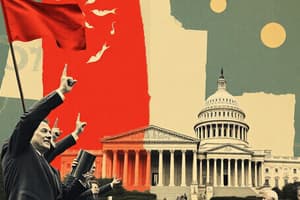Podcast
Questions and Answers
Which institutions play a key role in major decisions in a democracy?
Which institutions play a key role in major decisions in a democracy?
- Electoral Commission, Bureaucracy, and Local Councils
- Political Parties, Media, and Civil Society Organizations
- Legislature, Executive, and Judiciary (correct)
- Constitutional Monarchy, Federal Council, and Ombudsman
What is the core focus of Chapter 4 in the context of democracy?
What is the core focus of Chapter 4 in the context of democracy?
- Resolving disputes
- Working with and within institutions (correct)
- Implementing major decisions
- Electing rulers
What is the main objective of understanding the functioning of institutions in a democracy?
What is the main objective of understanding the functioning of institutions in a democracy?
- To compare institutions with non-democratic systems
- To understand how power is centralized
- To examine the role of international organizations
- To analyze the decision-making process (correct)
How does the chapter compare the institutions in India with those in other democracies?
How does the chapter compare the institutions in India with those in other democracies?
In what context is the term 'Central Government' used in the chapter?
In what context is the term 'Central Government' used in the chapter?
What makes the functioning of institutions more or less democratic according to the chapter?
What makes the functioning of institutions more or less democratic according to the chapter?
Who signed the Office Memorandum regarding the reservation of 27 per cent vacancies in civil posts and services under the Government of India?
Who signed the Office Memorandum regarding the reservation of 27 per cent vacancies in civil posts and services under the Government of India?
When was the Government Order (Office Memorandum) issued?
When was the Government Order (Office Memorandum) issued?
What was the main policy decision announced in the Office Memorandum?
What was the main policy decision announced in the Office Memorandum?
Who actually exercises all governmental powers as the head of the government?
Who actually exercises all governmental powers as the head of the government?
What does SEBC stand for in the context of the Office Memorandum?
What does SEBC stand for in the context of the Office Memorandum?
In which department was the officer who signed the Office Memorandum working?
In which department was the officer who signed the Office Memorandum working?
Who must have the support of a majority of Lok Sabha members according to the text?
Who must have the support of a majority of Lok Sabha members according to the text?
How many houses does the Parliament consist of?
How many houses does the Parliament consist of?
Which category was newly introduced by the Office Memorandum for job reservation?
Which category was newly introduced by the Office Memorandum for job reservation?
Who is considered to be the highest formal authority in the country?
Who is considered to be the highest formal authority in the country?
Flashcards are hidden until you start studying




